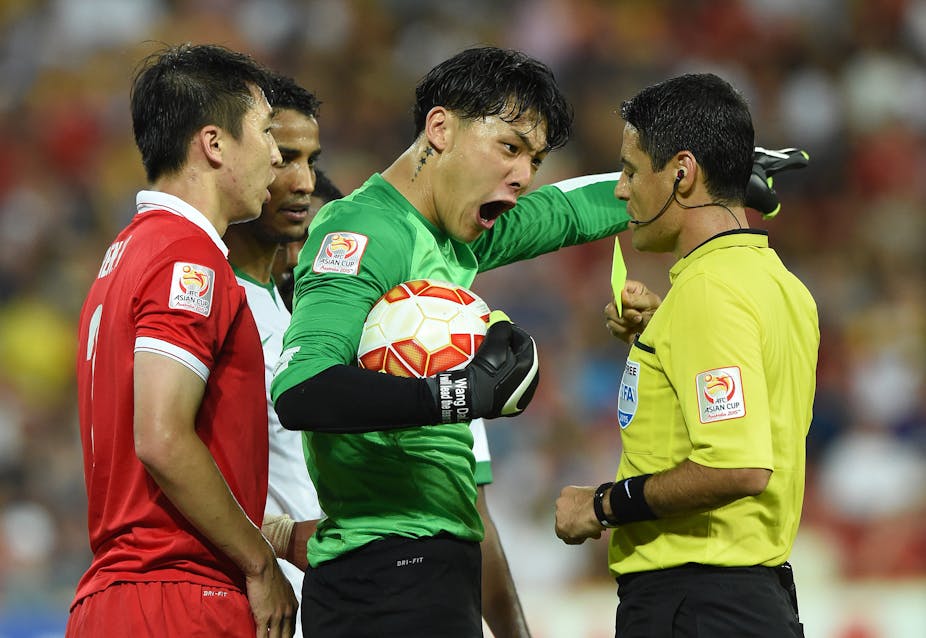Sports-mad Australians are in the middle of a busy summer of world-class sport. We’re currently gripped by football frenzy as the best players in Asia ply their craft in the Asian Cup. The world’s richest cricket team, India, has just lost to Australia in a four-Test series and the world’s best tennis players are currently spotted around our major cities. And not to be forgotten, cricket’s summer finishes with the World Cup.
The stakes are high. Most of the sports mentioned are operating under tournament conditions, where each game is vital and players are under pressure to perform and make the winning play. But more than just players and coaches are under scrutiny. With a summer of quality sporting talent on display, it is worth considering that we also have world-class officials – referees, umpires and judges – testing their skills and, often, operating under more scrutiny than any single player.
Officiating is a rewarding but thankless job in professional sport. Criticism occurs routinely and praise is often an afterthought. For example, Japanese striker Keisuke Honda, fresh from Japan’s 4-0 win over Palestine in the Asian Cup, publicly criticised the standard of refereeing.
In the final of the Hopman Cup – a key Australian Open lead-up event – Team USA spent five minutes arguing with the chair umpire and tournament referee.
Rather than criticising the official and their decision-making, players, coaches, spectators and the media should take a closer look at both the proverbial and literal playing field the official operates on and appreciate their skill and tenacity.

Follow the money
In 2012-13, UEFA, the governing body of football in Europe, spent €29.2 million on “referees and match officials” for 1823 matches, ranging from underage internationals to the Champions League final.
Rough calculations put the average expenditure per match at €16,017 to cover the match fees, flights and accommodation for the four referees and supporting officials, as well as training and administration overheads.
Radamel Falcao, currently on loan to Manchester United, is reportedly paid £265,000 per week. Officials are well-paid, but there should be no doubt they are driven by their love of the game and not a weekly pay cheque.
Officials are skilful too
As we delight in the skills of the likes of Roger Federer, Virat Kohli and Tim Cahill, take a moment to consider the skills of the unseen arbiter of the laws and rules. The decision-making of international sports officials is the best in the world. We’re not going to see anything better today.
According to the English Football Association, we’ve never seen more accurate decision-making. English Premier League referees are sitting at 95% accuracy. In how many games does Cristiano Ronaldo, the world’s best footballer, achieve 95% passing accuracy? He doesn’t.
Closer to home, the International Cricket Council’s (ICC) elite panel of umpires operated at a correct-decision average of 94% in 2012/2013 (with technology assistance). What percentage of the time does a batsman play the right shot to a ball? As a spectator, how often do we think an unsuccessful LBW appeal is out before seeing the HawkEye result and feeling embarrassed?
The globalisation of officiating
For several decades, international sporting codes have insisted on the neutrality of their officials to mitigate the risk of home-nation bias. As a result, the officiating system has become increasingly globalised.
An internationally qualified official will rarely have a “home” game. They live out of their suitcase and work with other officials whose only thing in common is the love of the game they officiate.

Quality control at the international level is also difficult. Players in a national or club team spend up to ten months of the year together, training as a group and understanding each others’ strengths and weakness. This understanding is vital to their successful performance as a team.
International officials train within their own country with their national bodies. Training together at the international level might be limited to international tournaments or periodic training camps and teleconferences.
Within a single month in a season, an official may officiate at three different levels of competition. Ensuring each official is on the same page at the same time under these conditions is a great challenge, but one that international sporting organisations are adept at handling.
An even playing field
Investment has occurred in most sports to improve the quality of decisions and the well-being of the official. But there is always room for more.
For example, the ICC could invest its revenue surplus to supply a universal Decision Review System (DRS) for every international fixture, not just ICC-organised fixtures such as the World Cup. This would ensure that every Test and One-Day International is officiated under the same conditions. Currently, an ICC umpire needs to change their approach to decision-making from one game to the next at the same level of competition.
Although officials are achieving better performance than ever before, elite sporting bodies can still invest more into officials’ training and teamwork. Investments in sports science, both physically and cognitively, can help improve the already high standard of officiating.
The rapid introduction of technologies to aid decisions brings new challenges. A cricketer would not use a new bat design at the international level without testing in other competitions. Can the same be said for DRS? Research can solve uncertainty in how officials can best use decision-aid technology – not just on the accuracy of the technology, but also its translation into officiating.
Ultimately, elite international officials should have the same level of support, training and facilities that society affords to other world-leading professionals.
When the dust settles there will be winners and losers. Through our summer of sport, it is worth remembering how well sports officials are actually performing, along with the constraints that they are operating under. Rather than focusing on the one decision out of 100 that they get wrong, let’s celebrate their performance.

